Looking ahead to the clay season: Is 2024 the year of the young-guns?
The clay season promises to be one of high level and tight margins. With the Monte Carlo open just around the corner, it will…
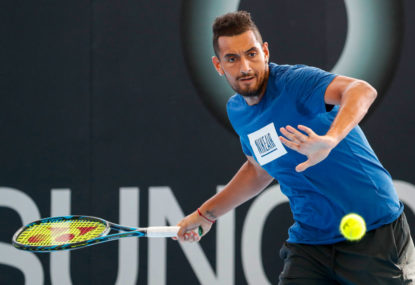
Not for the first time in his career, Nick Kyrgios has exited a tournament to a chorus of boos as he retired from his match against Britain’s Cameron Norrie in the second round of the Atlanta Open.
The Australian was trailing 7-5 3-0 when he decided to pull the plug on the match as he succumbed to a hip injury. In spite of this, Kyrgios’ notorious reputation preceded him and the crowd were unsympathetic in their thoughts on his retirement.
The trouble is when you have shown on countless occasions a problem with attitude and even been outspoken about it as much as Kyrgios has, it would take a long road back to rebuild your image, a road that Kyrgios is sadly not moving quickly enough on.
As Australians, we have always been demanding on our athletes in that we expect them to fight and bleed for their country until the contest is over in the true spirit of the Australian battler.
Representatives for the country across other sporting codes demonstrate this almost consistently, case in point Socceroos at the 2018 FIFA World Cup where they bowed out, not due to a lack of effort but rather talent.
Even in the same sport of tennis with Alex de Minaur, who despite losing in the first round at the Australian Open this year, won over the hearts of many of his countrymen for his determination and fighting spirit across the Australian summer in Sydney and Brisbane.
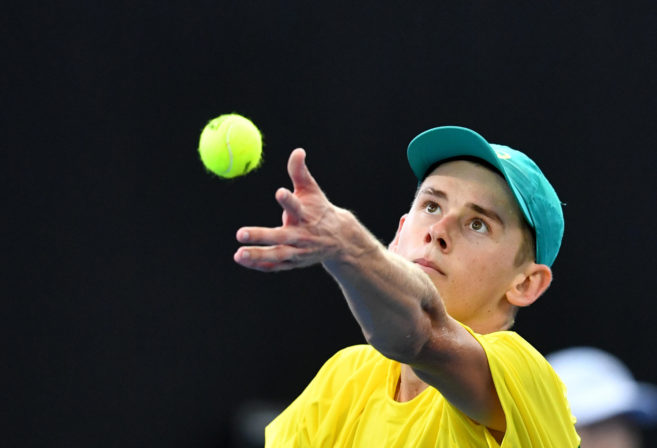
( AAP Image/Darren England)
It’s ingrained into the DNA of every sports viewer in Australia that they expect their teams and players to give it their all, to fight hard and demonstrate the Australian fighting spirit.
So, when it comes to those who don’t adhere to these expectations such as the likes of Kyrgios or Tomic, who unlike Kyrgios is rapidly fading out of relevance, the backlash would be merciless and everlasting especially in the sport of tennis where it is just you and your opponent on stage and there aren’t teammates to hide behind.
As the top ranked male Australian player on tour, the spotlight shines even heavier on Kyrgios especially as he has been hailed as one of the most talented players to pick up the racquet.
What we see is a player who is capable of moments of exhilarating brilliance at times, such as when he dispatched the top ranked player in Novak Djokovic twice within weeks in 2017, but also is capable of producing acts of self-destruction that extends to his image on and off court.
But that is what we, as the general sporting audience see. So now let’s try to understand what the reasons are for what makes Kyrgios who he is and what lies ahead for him.
Kyrgios has openly admitted in the past that he does not love the sport of tennis and he has been open about being more passionate towards basketball. Tennis to him, is just a job, a job that he was “pushed into by his parents.”
On the basis of this statement, it might seem quite alarming that a professional athlete would shun the sport that he plays and even so at such a young age. But is it really something that is that difficult to comprehend?
A study by the Associated Career Management Australia has shown that people in their 20s change jobs on average every 18 months showing that this is the period in an individual’s life when they are most uncertain while also the most curious in regards to their careers.
People hop from job to job due to job dissatisfaction or in search of something that they are more passionate about. So really, Kyrgios is no different to anybody else his age.
Picture yourself working in an office as an admin clerk, imagine how your work ethic, job performance and attitude would be if you were not getting fulfilment or did not see value in the role. Hard to stay motivated and perform well, isn’t it? This is how Kyrgios feels about tennis right now, unfortunately.
Why unfortunately though? People have a right to dislike their job, right? Well, the issue for Kyrgios is that his is a job where his face is on television screens across the world, his is a job that his performance can be seen, heard about and read by everybody. This is not a job where you can still turn up on autopilot, do a 9am to 5pm shift, then go home.
His job requires him to compete, fight and drive himself to be better than the man on the other side of the net. His job requires him to be driven and passionate about it. His is a job that does not allow for uncertainty on whether you love it or not.
But does Kyrgios hold the sport in as much contempt as he says? We see a man who drifts in and out of games, a man who is often accused of tanking matches. He is also condemned for his conduct and failure to contain his emotions on court, often flying into rage at himself, the crowd, the umpire or his own player’s box.
These are not the actions of somebody who does not care about the outcome of what they are doing, these are the emotions and reactions of somebody who wants to win, somebody who is disappointed in the end product of what they are producing. Why else would he bother expending his energy and emotions on these moments?
Anger and fury is a better emotion than despondency for an athlete. Anger and fury at the minimum shows disappointment in not performing well and if channelled correctly can lead to drive.
Great players of the past have been subject to on court outbursts, players such as Roger Federer, Lleyton Hewitt, John McEnroe, Andy Murray and Novak Djokovic. The key is not to let it consume you and lead to something other than drive and motivation.
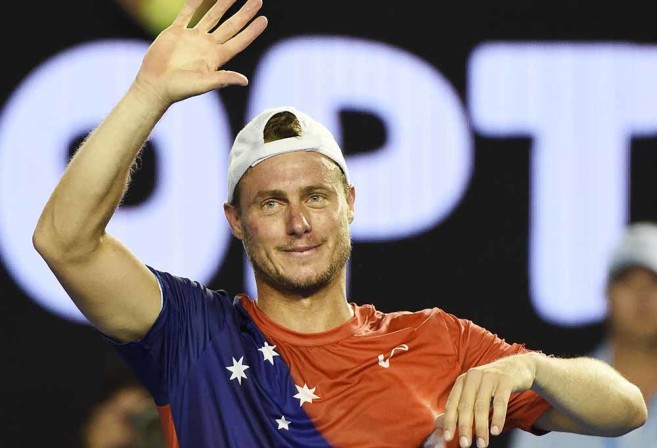
(Kyodo)
==Kyodo
Sadly, for Kyrgios, on occasions he has let this overcome him and the outcome has seen him tank games or even walked off court mid match.
How then does Kyrgios solve the puzzle of his own mind? He believes he doesn’t care about the sport and owes it nothing, but a mentality like this can be detrimental to your performance in your “job” which in turn leads to your anger at a job you said you don’t care about.
It’s a paradox that solely Kyrgios must decide which side of the fence he wishes to choose as it seems at times he himself is not sure if he cares or not about the game.
The world of sport is brutal and it doesn’t allow time for you to find yourself and decide if you want to play the game long term or not.
Perhaps it’s support Kyrgios requires to understand this and Kyrgios is definitely a man who requires support to excel, whether he would admit this or not.
A look at his results would back this view. His performances are generally better at the start of the year when he is in Australia and has the backing of the nation, for the most part anyways, and with his friends and family in his player’s box.
He also does well in Wimbledon where the surface supports his game and the crowd are less likely to get on your back as they would in the American or French circuit of the tour.
An example of this being in Miami 2017 where Kyrgios battled Federer manfully but allowed the hostility of the crowd to take his mind of the game. But the mark of a great player is one who pushes through difficult times and fights even when things aren’t going their way or when they are playing against a crowd who are against them.
A step in the right direction for the Canberrean would be to first appoint himself a coach, a strong coach as well. Coaches are there by a player’s side no matter what and are the consistent cornerstone of support. A person who you can at least look to when times are tough, a person who can provide perspective and a sense of assurance.
Kyrgios has spoken at times of his friendship with Andy Murray, a man whose tennis path does not differ much to that of his Aussie. Murray too was volatile, emotional and prone to outbursts that would derail his matches early on in his career.
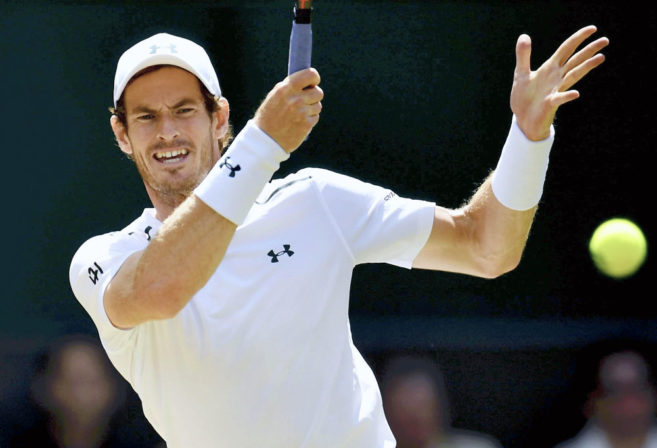
( The Yomiuri Shimbun via AP Images )
That was until he made the masterstroke of appointing Ivan Lendl as his coach. Under Lendl’s uncompromising, direct and calm tutelage, Murray excelled, leading him to win two Grand Slams during their first spell together and then once more under their second partnership.
During the period where Murray was not with Lendl, his performances wanned and his outbursts again started to impact his game as seen at the 2015 and 2016 Australian Open finals where he lost convincingly both times to Djokovic, a man he was able to defeat twice in Grand Slams under Lendl.
There are personality traits in Kyrgios mirroring Murray. Both are volatile emotionally at times but the difference is that Murray is clear on where he stands with the sport. He knows he is passionate about the game and knows he wants to win. This is a step Kyrgios must first decide for himself as what he says about the game and how he reacts to disappointment on court can be contradicting at times.
If he does decide that the game is where he wants to be, then the next step would be to appoint a coach and right now with Lendl having split with Murray, there is no better time for the Australian to have the great man in his player’s box.
The talent is there for the young Australian but the questions surrounding him lie with his mentality and emotions. A player does not knock off Nadal, Federer and Djokovic on his first encounter with them without possessing supreme talent.
However, great as these wins are, they have come in ATP Masters tournaments and Kyrgios has not translated them to Grand Slam performances where the stacks are even higher and the matches more physical and mentally taxing.
Yes, he has defeated Nadal but that came during a period for the great Spaniard where his exits came in the second round, first round, fourth round to Kyrgios, second round and fourth round. An argument could be made that Nadal’s game was already declining on grass at this stage.
But again, this is not to discredit Kyrgios’ victories against the big three as they are impressive particularly when it comes on your first attempt. However, Kyrgios must accept that this is only the first step for him and only great victories are remembered in Grand Slams.
These are the real tests. Right now, he has the talent, but when the time comes to go the distance are when questions will be asked of him.
Something Kyrgios does have on his side is time, Lendl and Murray won their first majors at 24 and 25 respectively. Kyrgios is 23. But is this something that Kyrgios wants? Does he want his legacy to be like that of Lendl or Murray’s or does he wish to continue on his career as he is. Finishing somewhere in the rankings from 15 to 30? If he does come to the conclusion that tennis is definitely not where his passion and energy lies then that’s the path that is paved for him.
Conversely, if Kyrgios does realise that he wants to invest his energy in tennis then the talent is there for him to succeed. Kyrgios’ most impressive performance to date might, dare we say it, are not even the victories he has secured over Nadal, Federer or Djokovic.
But rather in his first Grand Slam loss to Benoit Paire, in this game a young Kyrgios went down in five physical sets to the Frenchman. What made this performance a benchmark for Kyrgios?
Struggling with cramp and barely able to even walk and playing in his first Grand Slam second round, Kyrgios fought until the end and refused to retire eventually losing the match but winning the love and support of the nation. Here was a man who showed courage, bravery and determination, a man who inspired. Kyrgios needs to discover this man inside him once again.
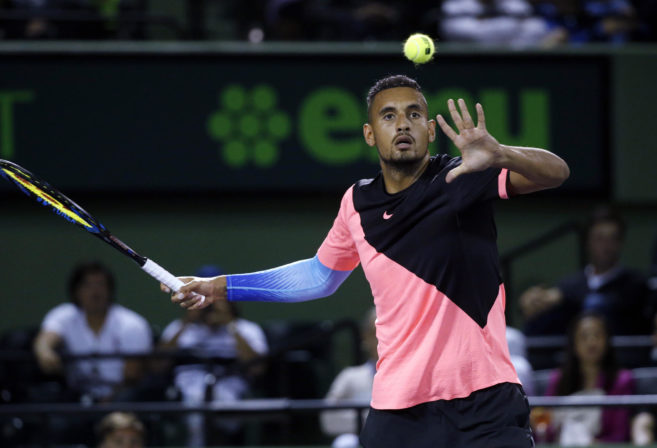
(AP Photo/Wilfredo Lee)
We can’t hate or condemn somebody for not being passionate about their job, there are times when all of us feel this in our lives. However, the reality in life is that as a sportsman, your every move and action is judged and dissected.
It comes with the profession because there are children across the world who look up to you and the joy and jubilation of your countrymen rests on your shoulders.
Yes, this can be a lot for a young man in his 20s, but this is the path he is on now.